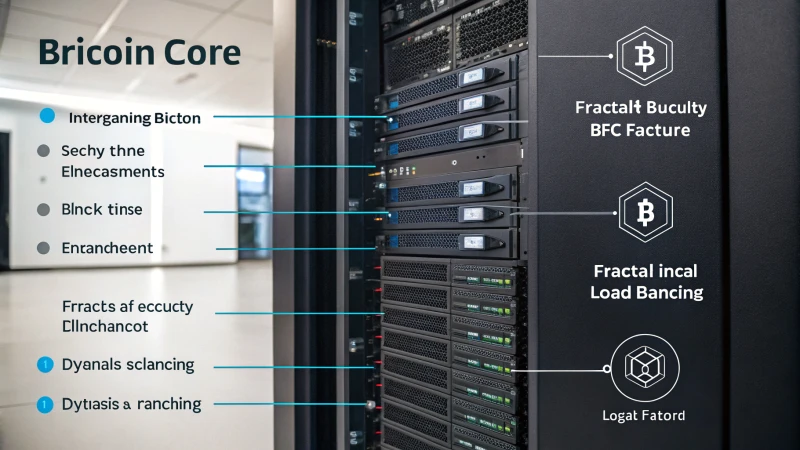
In the fast-paced world of cryptocurrency, every moment matters a lot. Fractal Bitcoin stands out with its very quick transaction processing. Speed is important here. Innovation drives this technology.
Fractal Bitcoin uses many strategies to keep latency low for users. It features 30-second block times and recursive layering. The system uses dynamic load balancing. It also employs a hybrid mining mechanism. These innovations increase transaction speed and efficiency. Fractal Bitcoin becomes a really appealing choice for cryptocurrency uses.
When I first explored Fractal Bitcoin, I was really amazed by their strategies to keep latency low. The network confirms transactions in just 30 seconds. This speed is very different from the usual 10-minute wait with traditional Bitcoin. Recursive layering caught my interest. It’s like having many lanes on a highway that expand as traffic grows. Everything stays smooth without delays. Dynamic load balancing resembles a well-organized team effort. Tasks get distributed efficiently so no layer gets overwhelmed. Smart contracts also left an impression. They make processes simple and tailor transactions to fit our needs.
How Does Recursive Layering Improve Transaction Speed?
Do you ever feel frustrated while waiting for a transaction to finish? Recursive layering transforms this experience, especially in Fractal Bitcoin. This change really improves the process.
Recursive layering greatly increases transaction speed by allowing multiple layers to work together at the same time. During busy periods, this setup handles transactions more smoothly, cutting down delays and improving user experience. It’s a big change!
Understanding Recursive Layering
What really is recursive layering? At its core, this clever feature in Fractal Bitcoin lets different layers process transactions simultaneously. Picture a crowded café with only one barista. Now, imagine several baristas taking orders and serving drinks – much smoother, right? As transaction numbers grow, more layers jump in to handle the load. They do this without using up all existing resources.
I invested in a digital asset once and anxiously waited for transaction confirmations. The stress of watching the clock while hoping it would go through was intense! Recursive layering might eliminate that kind of anxiety.
Mechanisms Behind Recursive Layering
- Independent Processing
Each layer operates on its own, allowing transactions to be processed at the same time. This is like having several lanes open at a toll booth. It keeps traffic moving rather than stuck in one line. - Dynamic Activation
Think of your favorite restaurant bringing in extra staff during busy times – this is what Fractal Bitcoin does. Layers activate depending on the current transaction load, adjusting to demand easily. - Load Distribution
Fractal Bitcoin spreads transactions over several layers, avoiding congestion in one layer. This balance gives fast transaction confirmations even in busy times.
Comparison of Transaction Confirmation Times
This table shows the difference in transaction confirmation times clearly! The benefit of recursive layering is clear and emphasizes its advantages.
Real-World Applications
Recursive layering’s real-world uses are wide and thrilling! In high-frequency trading, where every second matters, this tech could mean winning or losing. Traders feel secure knowing they won’t be delayed when speed counts!
Also, apps needing quick responses – like gaming or small transactions – will do well with this setup. It’s like getting a fast reply from a friend compared to a delayed one. One is much better!
As developers explore new blockchain apps, understanding recursive layering can really improve their systems. Those interested in dynamic load balancing will find this method matches their goals for efficient resource use.
In conclusion, recursive layering isn’t just complicated talk. It’s a useful change that speeds up transactions and improves network performance in Fractal Bitcoin. Watching blockchain tech grow, such innovations will guide us toward even more efficient systems that keep our dealings smooth and seamless.

Understanding Recursive Layering
During my journey through the captivating world of blockchain technology, I often thought about the complex details of transaction speeds. Recursive layering might seem overwhelming at first. But it’s a clever solution. This innovative approach will probably change how we view transactions in the blockchain space. Let’s explore it together!
Recursive layering is a unique architectural feature that Fractal Bitcoin employs to improve transaction speed. At its core, it allows for multiple layers of processing to exist simultaneously, which can independently handle transactions.
This structure is vital for scalability. As the volume of transactions increases, additional layers can be deployed without straining existing resources. This method not only maintains but enhances transaction efficiency. For instance, when one layer becomes saturated with transactions, other layers can be activated to share the load, ensuring that transaction speeds remain optimal.
Mechanisms Behind Recursive Layering
- Independent Processing
Each layer operates independently, meaning that transactions can be processed in parallel rather than sequentially. This reduces bottlenecks and allows for faster confirmation times. - Dynamic Activation
Layers can be activated on demand based on current transaction loads. This dynamic scaling means that Fractal Bitcoin can adapt to varying traffic levels without compromising speed or efficiency. - Load Distribution
By distributing transactions across several layers, the system can prevent congestion in any single layer. This load balancing ensures that users experience quick transaction confirmations even during peak times.
Comparison of Transaction Confirmation Times
| Transaction System | Confirmation Time | Scalability |
|---|---|---|
| Traditional Bitcoin | 10 minutes | Limited |
| Fractal Bitcoin | ~30 seconds | High (due to recursive layering) |
This table illustrates the stark difference in transaction confirmation times between traditional Bitcoin and Fractal Bitcoin, highlighting the benefits of recursive layering.
Real-World Applications
The practical implications of recursive layering are vast. For example, in high-frequency trading environments where every second counts, the ability to confirm transactions quickly can lead to significant financial gains. Moreover, applications requiring rapid responses, such as gaming or microtransactions, benefit immensely from this architecture.
Furthermore, as developers explore new blockchain applications, understanding how recursive layering works can help optimize their systems for better performance. For instance, those interested in dynamic load balancing1 strategies will find that recursive layering aligns perfectly with their goals for efficient resource management.
In conclusion, recursive layering is not just a theoretical concept but a practical enhancement that significantly boosts transaction speeds and overall network performance in Fractal Bitcoin. As blockchain technology continues to evolve, innovations like these will pave the way for even more efficient systems.
What Role Does Dynamic Load Balancing Play in Network Efficiency?
Dynamic load balancing is crucial for keeping the network very efficient. But how does it work? What advantages does it give to users and applications?
Dynamic load balancing helps network efficiency. It distributes workloads across many resources. Bottlenecks do not occur because of this. Latency decreases as a result. It really improves overall performance. Performance improves greatly during peak usage times.

Understanding Dynamic Load Balancing
Dynamic load balancing is a crucial technique in network management that optimally distributes workloads across multiple resources. This ensures that no single resource is overwhelmed, which is vital for maintaining high performance and stability.
When I began exploring network management, I quickly saw dynamic load balancing as the conductor of an orchestra. This important method shares tasks across multiple resources. This way, no single resource gets overloaded. I once saw a server fail during a big product launch because it couldn’t handle all the traffic. That experience showed me how crucial this process is for keeping things running smoothly.
Picture a busy cloud computing environment with many servers handling user requests. Without dynamic load balancing, one server might get too much traffic while others remain underutilized. This imbalance can lead to slower response times and potential server crashes.
How It Works in Real-Time
Dynamic load balancing algorithms analyze traffic patterns and resource utilization in real-time. They adaptively adjust the distribution of workloads based on current demands. Here are some algorithms I’ve found very effective:
| Algorithm | Description | Use Case |
|---|---|---|
| Round Robin | Distributes requests sequentially across servers. | Simple web applications. |
| Least Connections | Directs traffic to the server with the fewest active connections. | High-traffic websites. |
| IP Hashing | Routes requests based on the client’s IP address. | Stateful applications. |
Benefits of Dynamic Load Balancing
Dynamic load balancing contributes significantly to network efficiency in several ways:
- Improved Resource Utilization: It ensures that all servers are used optimally, reducing waste and enhancing performance. I’ve seen it help avoid costly downtime.
- Reduced Latency: By preventing any single resource from becoming a bottleneck, it minimizes delays in processing requests; I’ve noticed this during crucial projects.
- Scalability: As demand increases, dynamic load balancing allows for the addition of more resources seamlessly, ensuring continuous performance without downtime; this has been a real game-changer during peak seasons.
For more insights on how these concepts apply in practical scenarios, check out advanced load balancing techniques2.
The Impact on Network Performance
In a scenario where dynamic load balancing is effectively implemented, the overall network performance can see substantial improvements. Consider a financial trading platform:
- Transaction Speed: With dynamic load balancing, the platform can handle thousands of transactions per second without lag; I felt certain of its reliability.
- Reliability: Even during peak trading hours, performance remains stable due to efficient resource allocation; I felt relieved knowing everything ran smoothly.
- User Experience: Faster transactions enhance user satisfaction, critical for retaining clients in competitive markets; this is something I always aim for.
To explore the relationship between load balancing and user experience further, visit user experience and network efficiency3.
Conclusion on Dynamic Load Balancing’s Role
Dynamic load balancing plays an integral role in ensuring network efficiency by intelligently distributing workloads and preventing resource bottlenecks. From my experiences, this technique is vital for maintaining high performance in various applications, particularly in high-demand environments like cryptocurrency platforms and cloud services.
For additional readings on optimizing network infrastructure through load balancing strategies, check this resource on optimizing network performance4.
Why Are 30-Second Block Times Essential for High-Frequency Trading?
Have you felt the thrill of a trading moment where each second is important? Knowing the importance of 30-second block times in high-frequency trading is key. These moments probably hold an essential role in today’s exciting trading world.
30-second block times are crucial for high-frequency trading. They allow quick transaction confirmations. This speed increases market responsiveness. Efficiency also improves, supporting complex trading strategies.

Improving Market Quickness
I recall my first experience with trading. The excitement was noticeable, but it also brought lots of worry as I watched prices change. In fast-paced trading, every millisecond matters. Thirty-second block times really change the game. They let traders like us react quickly to market changes, so we don’t miss short-lived chances.
Take Bitcoin, for example. When I traded on regular networks, waiting for a 10-minute block felt very long. Often, a good trade passed by while I waited for confirmation. But with Fractal Bitcoin’s quick 30-second blocks, that problem is gone. Now, I can jump on trades fast, using methods like scalping to profit from short price changes. This isn’t just about me. Quick confirmation really improves market liquidity. It lets traders make bigger trades with less price change. For more on how speed helps trading, see the role of latency in trading5.
Expanding for More Volume
In high-frequency trading, volume matters. I often handle hundreds or thousands of trades each second. Thirty-second blocks help here. They allow for smooth transaction processing.
| Transaction Volume | Block Time | Market Impact |
|---|---|---|
| Low | 10 Minutes | Slower response |
| Moderate | 1 Minute | Acceptable |
| High | 30 Seconds | Optimal |
The table above shows shorter block times handle more transactions even during busy periods. This is very important for institutional traders. They trade large amounts and need immediate confirmations. For more on factors affecting trading networks, see scalability in cryptocurrency6.
Cutting Market Inefficiencies
In my early trading days, longer block times caused delays and inefficiencies. They left me quite frustrated. With 30-second blocks, those inefficiencies mostly disappear.
Quick confirmations let me enter and exit trades efficiently.
This change leads to tighter spreads and less slippage, making the market more appealing. If you’re curious about slippage and its effects, check out slippage and its implications7.
Supporting Advanced Trading Techniques
Many high-frequency strategies I enjoy depend on algorithms that execute trades based on specific rules. Thirty-second confirmations allow these systems to perform optimally.
Fast block times help advanced strategies like statistical arbitrage and market making where timing is crucial.
I remember spotting a price difference between exchanges; with Fractal Bitcoin’s fast confirmations, I acted quickly before the chance vanished.
For more on algorithmic strategies, see algorithmic trading techniques8.
How Does Fractal Bitcoin Maintain Compatibility with Bitcoin Core?
Do you wonder how Fractal Bitcoin works together with Bitcoin Core? Let’s explore its special ways of working together. These strategies really keep functionality good. They also protect the important compatibility.
Fractal Bitcoin matches Bitcoin Core by using its code. It leverages its secure traits and protocols. Fractal Bitcoin introduces new features. These include faster block times and dynamic load balancing. This synergy creates a very efficient and secure user experience. It provides smooth transactions for everyone.

Integration with Bitcoin Core Codebase
I started my journey into the world of cryptocurrencies. I felt amazed by the complex relationship between Fractal Bitcoin and Bitcoin Core. It resembles two skilled dancers. They move in sync. Each dancer complements the other while keeping their unique styles. Fractal Bitcoin rests right on the Bitcoin Core codebase, ensuring that it adheres to the established standards and protocols of the original Bitcoin network. This direct integration enables:
- Seamless Transactions: Users like us can execute transactions without worrying about compatibility issues.
- Security Features: It feels comforting to know that Fractal Bitcoin inherits Bitcoin’s strong security features, which are critical in maintaining user trust and safeguarding assets.
By leveraging the existing infrastructure, Fractal Bitcoin’s compatibility9 facilitates smoother interactions with Bitcoin wallets and exchanges.
Enhancing Functionality without Compromise
While maintaining compatibility, Fractal Bitcoin introduces advanced features that enhance its functionality:
| Feature | Description |
|---|---|
| 30-Second Block Times | Reduces confirmation times significantly, ideal for high-frequency trading. |
| Recursive Layering | Allows independent processing across multiple layers to handle increased load. |
| Dynamic Load Balancing | Ensures stable performance during peak times by distributing transaction loads. |
These enhancements do not disrupt the existing Bitcoin ecosystem, making Fractal Bitcoin a viable option10.
Benefits of Compatibility
The benefits of maintaining compatibility with Bitcoin Core are substantial:
- User Trust: Since users are already familiar with Bitcoin’s security, they are more likely to adopt Fractal Bitcoin.
- Ease of Transition: Developers and users can transition to Fractal Bitcoin without extensive retraining or reconfiguration of existing systems.
- Interoperability: Fractal Bitcoin can communicate effectively with other applications built on the Bitcoin protocol, fostering innovation and collaboration.
Understanding these benefits is crucial for anyone considering how Fractal Bitcoin fits into the larger ecosystem11.
Conclusion
Trust is very important in our crypto activities; it really matters. Fractal Bitcoin’s design philosophy revolves around enhancing the original Bitcoin experience while ensuring full compatibility. The integration of advanced features like smart contracts and hybrid mining methods makes it a compelling choice for users seeking efficient transaction processing without compromising on security or usability.
What Advantages Does the Hybrid Mining Mechanism Provide?
Do you ever think about how the hybrid mining method is transforming cryptocurrency transactions? Let’s explore its really interesting advantages together!
The hybrid mining method greatly increases efficiency, security and scalability. It also really reduces harm to the environment compared to old ways. This method mixes permissionless mining with merged mining. It smartly uses resources. It ensures quick transaction confirmations. It’s a groundbreaking method in cryptocurrency!
Enhanced Efficiency
Fractal Bitcoin’s hybrid mining is very efficient. It combines permissionless and merged mining. Resources get used wisely. Decentralization is strong.
The approach uses large networks like Bitcoin. Transactions confirm faster. Imagine waiting 30 seconds instead of 10 minutes. The difference is clear!
Faster confirmations are key for speed-focused applications, such as trading platforms. This feature attracts both developers and users.
Improved Security
Hybrid mining greatly improves security. Merged mining uses security from larger networks. Smaller networks gain strong protection.
This collaboration gives peace of mind. Smaller networks get robust defenses. The strategy ensures many layers of security. Risks like 51% attacks reduce. Traditions systems face more threats.
Scalability and Adaptability
Hybrid mining is very adaptable to network changes. Fractal Bitcoin uses dynamic resource balancing. It allocates resources based on current needs.
During peak times, the network remains stable. Recursive layering supports scaling. New layers activate smoothly as transaction loads grow. Performance remains steady.
Environmental Considerations
Hybrid mining really addresses environmental issues of traditional methods. It reduces waste and improves resource use – a more eco-friendly choice.
Block confirmation is faster. Efficient resource management cuts energy use. The approach appeals to eco-conscious users.
Want more on energy efficiency? See this in-depth analysis.
Conclusion
In short, hybrid mining provides great benefits. It improves efficiency and security. It scales easily and lowers environmental impact. These benefits mark a major evolution in crypto mining. Both developers and users will probably find it appealing.

Hybrid Mining: A New Perspective
I learned about hybrid mining for the first time. I was genuinely surprised. Hybrid mining really changes how we understand cryptocurrency. The mix of permissionless and merged mining is refreshing. This change is in an industry often criticized for using too much energy. People also criticize its inefficiencies. Hybrid mining feels like finding a shortcut. This shortcut speeds up the process. It keeps everything secure, too. It remains decentralized.
Let’s explore these benefits together!
Enhanced Efficiency
Hybrid mining mechanisms significantly improve efficiency compared to traditional mining methods by combining permissionless mining with merged mining, optimizing resource use while ensuring that activities remain decentralized.
This dual approach not only leverages the substantial hashrate of existing networks but also allows for quicker transaction confirmations, resulting in a more responsive network that can handle higher transaction volumes with ease.
For example, consider the transaction speed differences:
| Mining Method | Average Transaction Confirmation Time | Decentralization Level |
|---|---|---|
| Traditional Mining | ~10 minutes | Moderate |
| Hybrid Mining | ~30 seconds | High |
Such improvements in confirmation times can be crucial for applications requiring rapid execution, such as trading platforms and other financial services. This aspect alone makes hybrid mining a compelling choice for developers and users alike.
Improved Security
One of the notable advantages of hybrid mining is its ability to enhance security. By utilizing merged mining, hybrid systems can tap into the security features of established networks without sacrificing their own integrity.
This synergy means that even smaller networks can benefit from the robust security that a larger network provides, which mitigates risks associated with attacks.
Moreover, security in hybrid mining is further bolstered by its decentralized nature, reducing the chances of a single point of failure and making it inherently more secure against various threats, including 51% attacks that can plague traditional setups.
Scalability and Adaptability
Hybrid mining mechanisms can adapt to changing network demands due to their efficient resource management capabilities. For instance, dynamic load balancing intelligently allocates resources in real-time based on current demand.
This adaptability ensures that the network remains stable and efficient even during peak usage times. The implementation of recursive layering allows for seamless scalability where additional layers can be activated to accommodate increased transaction loads without compromising performance.
Environmental Considerations
As the cryptocurrency landscape evolves, so do concerns about the environmental impact of mining operations. Hybrid mining presents a more energy-efficient alternative by optimizing resource allocation and reducing wastage.
By decreasing the time required for block confirmations and efficiently managing resources, hybrid systems can potentially lower overall energy consumption associated with activities—particularly relevant for environmentally-conscious investors seeking sustainable solutions within blockchain space.
For further insights on energy efficiency in different methods, check out this in-depth analysis12.
In summary, hybrid mining offers numerous advantages including enhanced efficiency, improved security, scalability, and reduced environmental impact—positioning it as a vital evolution in cryptocurrency landscape appealing to both developers and users.
Conclusion
Fractal Bitcoin utilizes advanced techniques such as recursive layering and dynamic load balancing to achieve rapid transaction confirmations, enhancing user experience in cryptocurrency applications.
- Clicking this link will provide you with detailed strategies on optimizing blockchain performance through load balancing techniques.
- Discover how dynamic load balancing can optimize your network’s performance and enhance resource management effectively.
- Learn how dynamic load balancing improves user experience and transaction speeds in high-demand applications.
- Explore effective strategies for optimizing your network infrastructure using load balancing methods.
- Discover how shorter block times improve trading efficiency and responsiveness, essential for maximizing profits in fast-paced markets.
- Learn about the importance of scalability in trading networks and how it benefits high-frequency traders.
- Find out how slippage affects trading performance and why reducing it is crucial for successful trading strategies.
- Explore different algorithmic trading techniques that leverage fast transaction processing to optimize trade execution.
- This link offers a deeper understanding of how Fractal Bitcoin utilizes the existing Bitcoin framework, making it essential for grasping its compatibility features.
- Explore advanced functionalities introduced by Fractal Bitcoin without compromising on compatibility, crucial for developers and investors.
- Discover the interoperability advantages of Fractal Bitcoin within the cryptocurrency ecosystem, significant for tech enthusiasts.
- Explore how hybrid mining mechanisms can enhance your understanding of cryptocurrency and potentially guide your investment decisions.

